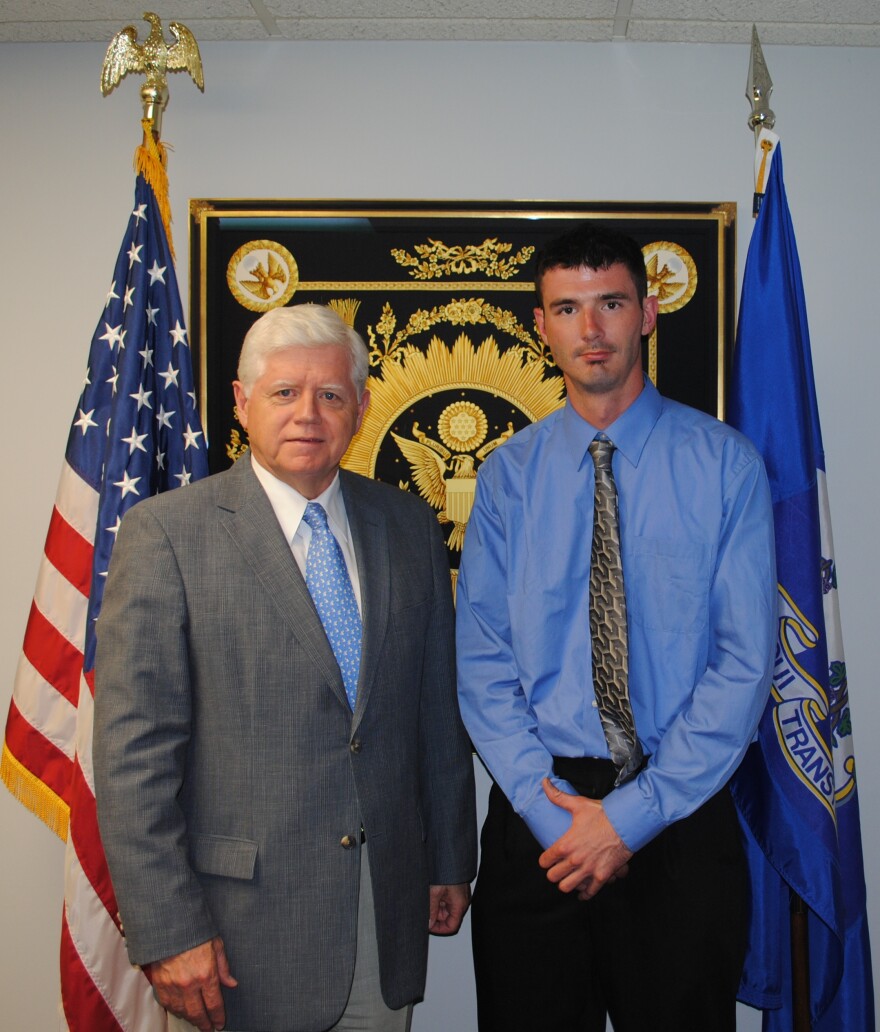http://cptv.vo.llnwd.net/o2/ypmwebcontent/2011/2011_07_13_LN%20110713%20wounded%20warrior%20feature.mp3
The U.S Department of Labor says nearly 12 percent of veterans who've served since 9-11 were unemployed last year. Twenty-five percent of them have service-related disabilities. The number of unemployed is expected to grow now that more veterans from Iraq and Afghanistan are returning to a country trying to recover from the recession. A small program by Congress aims to help veterans get back into the workforce.
WNPR's Lucy Nalpathanchil profiles a Marine from Manchester who's working for Congressman John Larson. Like most veterans who've been injured in war, 26-year old Ryan Dion remembers the day vividly. It happened during his second tour of duty in Fallujah, a hotbed of insurgent activity during the Iraq War.
"Sitting there all night with the squad just watching the roads for IED placement and I went out outside the courtyard wall there and someone had placed an IED right there, and blew up and I got hit along with another Marine." Dion says it's not easy to talk about this time in his life.The blast cost him to part of his right leg, amputated below the knee. He was fitted with a prosthetic and it took him a year and a half to recover from his injuries. In 2009, he was honorably discharged from the Marine Corps and so he returned to Connecticut. But Dion says transitioning back to civilian life was a challenge especially for veterans like him, who immediately went into the service after graduating high school.
"Their fellow friends that went off to college, they already have a big head start. Its' a tough market, you're not really too competitive. Especially if you have a family, your multi-tasking, you gotta work, go to school, and take care of the kids." To catch up, Dion started taking classes at Manchester Community College. Then he heard about the Wounded Warrior program through his local Veterans of Foreign Wars post. In 2008, Congress approved the unique fellowship program for veterans who have service related disabilities to work within the House of Representatives. He applied and got a job in Congressman John Larson's Hartford office working as a Veterans caseworker. "This is my workstation. I've got files and everything right here and this is my computer."
His cubicle sits near the Congressman's conference room. He helps veterans in the first congressional district who call the office for a variety of issues. Their calls range from asking for help obtaining discharge paperwork to applying for compensation or pension benefits. Dion says the fact he's a Marine helps him connect with veterans who typically are fed up with navigating the system after returning home. He walks us through a typical call.
" 'Did you serve? I say, 'yes', and they say, 'what branch?', I say, 'Marine Corps, 'what's your mls?', I say, 'infantry', and they say, 'Hoo-rah!' And right there, what could be a hostile conversation automatically turns into an awesome one and things get solved alot more quicker and better. " Rusty Meek is the retired VFW post commander in Manchester and a Vietnam Veteran. He says Dion's age and military experience are an asset in the caseworker position during a time when more and more solidiers in their 20s are returning from war.
"The fine line of me communicating with these kids and Ryan is, I'm an old man, and wars change. Ryan's been in harms way, he knows the sounds, he knows the smell, and he can talk to these kids."
Dion says he wants to help as many vets as he can. Just a month on the job and he's already driven to the homes of three veterans to meet them face to face to fill out the paperwork so their claims can be processed faster. His fellowship will end in two years so he's still taking classes and hopes to become a police officer. But the goal of the Wounded Warrior program isn't just helping veterans find jobs. Through the work of Dion and others like him in congressional offices across the country, attention is being given to the needs of the men and women who are still adjusting to civilian life after multiple tours overseas.



